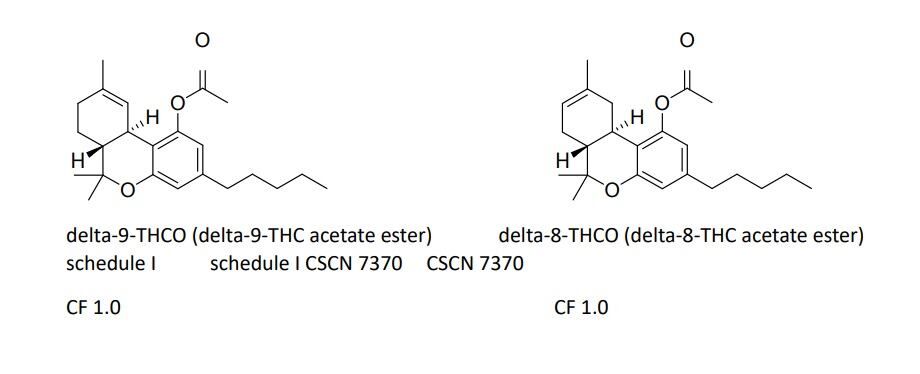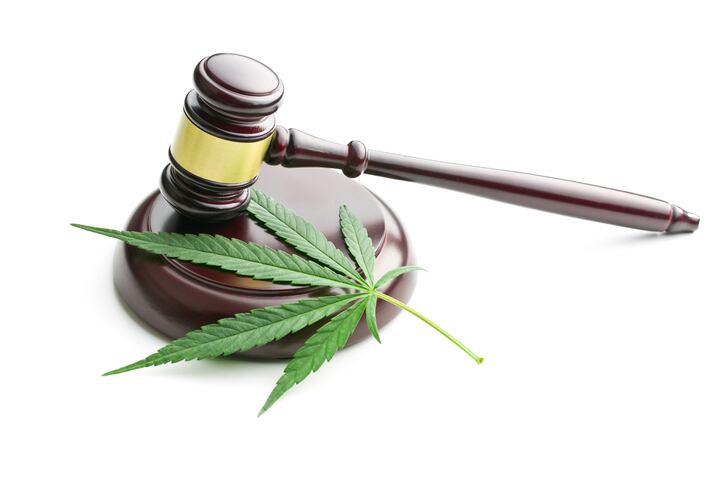The legalization of hemp and the many interpretations of the 2018 Farm Bill led to the expeditious commercialization of products containing Tetrahydrocannabinol (THCO), a synthetic cannabis compound.
THCO, also known as THC-O-acetate, is a compound that is not derived from hemp and therefore not found naturally in the hemp plant. Delta-8 THC and delta-9 THC exist naturally in the hemp plant, while THCO does not. THCO is synthesized using acetic anhydride.
What is delta-8?
The confusion lies in the chemical makeup. Delta-8 and delta-9 can also be synthetically derived using THCO.
“Delta-8 THC is one of over 100 known cannabinoids, however unlike CBD or delta-9 THC, it naturally occurs at extremely low levels. Due to a similar atomic structure, delta-8 is an isomer of delta-9 THC, where the difference in structure can be seen at the location of the double bond in the carbon chain. Delta-8 THC found in the majority of products today is not extracted from the plant, but by transforming CBD (or delta-9 THC) into delta-8 THC through the addition of non-polar organic solvents and acids,” Marielle Weintraub, US Hemp Authority President, explained in 2021.
Because most delta-8 and delta-9 are synthetically derived and contain THCO, the majority of the products on the market are likely considered controlled substances.
Delta-8 blurs the line
When interpreting the legal status of delta-8, many thought it fit in a legal gray area or loophole. The confusion surrounding the legality of Delta-8 led NutraIngredients-USA to reach out to DEA to inquire about the status in June 2021. At that time, DEA wasn’t even sure where the compound legally stood.
“As DEA is currently undergoing the rulemaking process regarding the implementation of the Agriculture Improvement Act of 2018 – which includes the scope of regulatory controls over marijuana, tetrahydrocannabinols, and other marijuana-related constituents – we would be unable to comment on an any impact in legality of tetrahydrocannabinols, delta-8 included, until the process is complete. We are in the process of reviewing thousands of comments and do not speculate on what could happen as a result,” said Katherine Pfaff, a spokesperson for DEA.
Status determined
However, DEA recently confirmed via letter that THCO is a controlled substance and illegal under federal law.
In August 2022 and again in February 2023, North Carolina attorney Rod Kight wrote to DEA to ask about the status of these cannabinoids under the Controlled Substances Act (CSA). His question was whether THC acetate ester (THCO) was a controlled substance and therefore illegal. In a February 2023 letter, the DEA responded and concluded that delta-8 and delta-9 THCO were, in fact, illegal controlled substances.
Upon examination of this letter, Patricia Knight and Peter Reinecke, UNPA Senior Political Advisors, explained that DEA determined that delta-8-THC acetate ester and delta-9-THC acetate ester are both controlled as Schedule 1 “because they do not occur naturally in the cannabis plant and can only be obtained synthetically; therefore, the agency concluded, they do not fall within the definition of hemp – a conclusion meaning they would not be sold legally under the 2018 Farm Bill.”
“The CSA classifies tetrahydrocannabinols (THC) as controlled in schedule I. 21 U.S.C. § 812, Schedule I(c)(17); 21 CFR 1308.11(d)(31). Subject to limited exceptions, for the purposes of the CSA, the term “tetrahydrocannabinols” means those “naturally contained in a plant of the genus Cannabis (cannabis plant), as well as synthetic equivalents of the substances contained in the cannabis plant and/or synthetic substances, derivatives, and their isomers with similar chemical structure and pharmacological activity to those substances contained in the plant.” 21 CFR § 1308.11(d)(31),” explained Terrence L. Boos, PhD, chief of the drug and chemical evaluation section diversion control division of DEA.
“Delta-9-THCO and delta-8-THCO do not occur naturally in the cannabis plant and can only be obtained synthetically, and therefore do not fall under the definition of hemp. Delta-9-THCO and delta-8-THCO are tetrahydrocannabinols having similar chemical structures and pharmacological activities to those contained in the cannabis plant. Thus, delta-9-THCO and delta-8-THCO meet the definition of “tetrahydrocannabinols,” and they (and products containing delta-9-THCO and delta-8THCO) are controlled in schedule I by 21 U.S.C. § 812(c) Schedule I, and 21 CFR § 1308.11(d).”
In the letter, Boos also provided an illustration of the chemical structures:

Implications
The letter also stated “The Drug Enforcement Administration (DEA) reviewed the CSA and its implementing regulations with regard to the control status of these substances.”
What exactly this means in terms of enforcing delta-8 and delta-9 THCO remains unclear. Another big question is how brands will shift from synthesized products to those naturally derived from hemp. Given the naturally derived delta-8 and delta-9 products only occur at extremely low levels, the natural route looks dubious.
Another question is what this means for potential legislation for a regulatory pathway for CBD and other hemp-derived dietary supplements. Knight and Reinecke wonder if this new stance would impact such legislation by requiring a specific disqualification for delta-8/9 or similar ingredients of concern. This question, let alone a regulatory pathway, are not expected to be resolved any time soon.




